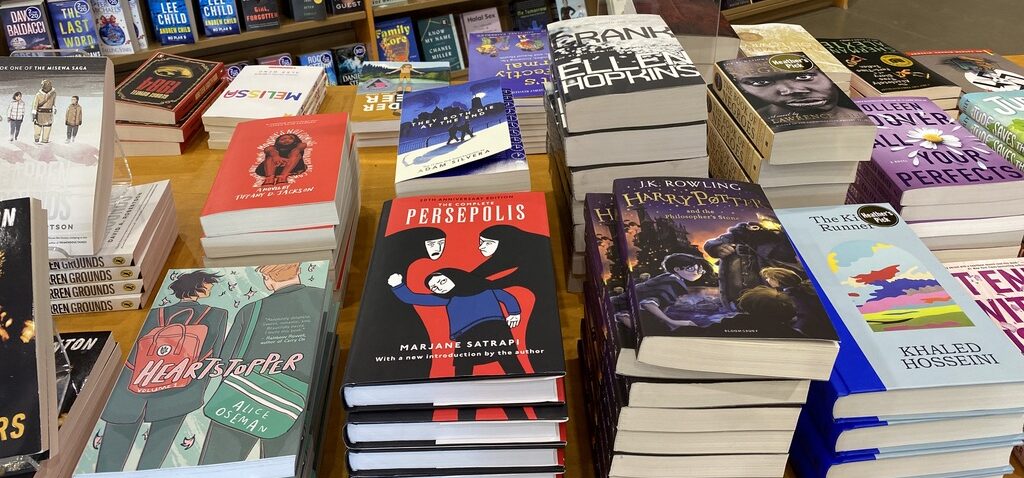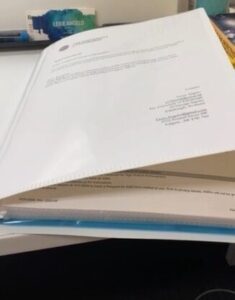The unconventional way to fund a PhD

Last week, I was awarded the Sir James Lougheed Award of Distinction for the second time. The scholarship is handed out to students in the Province of Alberta, studying at an international university, at either the doctoral or masters level. There are eight awards in the doctoral level, each for $20,000, and seven at the master’s level worth $15,000.
I won’t lie, when I got the notification that I was given the award for the second time – I cried. The financial stress of paying for a PhD without guaranteed funding from an organization like SGSAH means I have been walking a tightrope across a flaming pit of debt, hoping I don’t fall in. I wanted to offer my experience of funding my PhD using the (very risky) fund-as-I-go model, which has meant spending countless hours submitting scholarships applications with the goal of funding my degree from multiple sources.

Sir James Lougheed Award Letter
The mega binder
In my first year, I was awarded a $15,000 training and development grant from the Alberta Arts Foundation, and $15,000 from a writing project I did for a private client. With this, I covered all of the $30,000 CAD cost of annual international tuition fees.
In my second year, after twice being rejected for Sir James Lougheed Award of Distinction, I threw a hail mary and completely changed my application approach. I didn’t know what I was doing wrong, but it was evident that sending in a few stapled pages and a CV was not working. Even though the website only requires a few elements such as the application form, a recent CV, an essay, reference letters and transcripts – I decided to put together a mega binder full with every possible accomplishment I could think of. I went to Staples, got a nice binder, some plastic sleeves, and started assembling a massive portfolio of my work. Every page was printed in colour, and I included samples of my achievements, writing samples, thesis samples, and images that demonstrated I was worthy of investing in. These were included as an appendix, so the panel could cross-reference my essay statements with my samples.
And it worked.
I was awarded the scholarship of $20,000 which covered most of my tuition in my second year of studies. Thank god.

Sir James Lougheed Award Binder
What I said in my application
I’ve had quite a few people reach out to ask what I included in my application. I put alot of focus on my essay, touching on each of the points requested in the application. I spoke about why I wanted to study at the University of Edinburgh, what I had accomplished during my studies already, and what I planned to do going forward. I spent HOURS crafting my essay line-by-line, ensuring it fit on two pages, yet also including the most relevant information to help the panel understand what I was working on, who my supervisors were, and who might benefit from my research. Every discipline is different, so choose what stands out about you. For every item in my essay, I also provided evidence to back-up my statements such as publishing contracts, my teaching syllabus, and other award announcements.
You can read my essay here: Lexie Angelo Essay.
Arts funding is limited
Scholarship options for Canadian students studying the arts abroad is limited. At the University of Edinburgh, many scholarships are only available to first year students and I didn’t know what my PhD was necessarily about when I applied (a hazard of the arts). I didn’t have a clear vision of what the impact and outcome could be, and this put me at a disadvantage when applying for many university-backed funding schemes because I couldn’t articulate why my research was important, or what I was adding to existing scholarship.
And to be honest, I think I’ve felt this way until about two weeks ago – when my PhD finally made sense.
But there are local arts funding organizations in Canada. In my Province of Alberta, the Alberta Arts Foundation does cover tuition costs, whereas Calgary Arts Development only covers project-specific costs. I applied to Calgary Arts Development twice for funding to attend Bloody Scotland in September, which also covered my flight costs to the UK.
Getting one shot and failing
Since most university, council, or global scholarship schemes are only available for international students who are in their first year of studies, you only get one shot at them. But my first year was when I felt I was the least able to talk about my research, why it mattered, and what it was about. I genuinely did not know. The humanities is a murky and nebulous field, and I needed to feel out my research topic, often going down unusual paths before circling back, and revisiting original ideas. Who wants to invest in a student who doesn’t really know what they are doing yet? The answer was, nobody did. And I was not selected for at least ten, or possibly more (I’ve lost count) of scholarships and awards. Some applications, such as the Trudeau Foundation or Commonwealth Scholarships, were so taxing, mentally exhausting and complex, that I did not re-apply for them after my first year.
Financial stress is real
My third year came with a level of financial stress that I was not expecting. I was not confident that I was going to the Sir James Lougheed award for a second time, and so I took out a student loan to bridge the gap just in case. These are not easy decisions because it was drilled into me during my MSc not to pay for your PhD. And I told my spouse that I wouldn’t do a PhD unless it was funded. Only to find myself staring down at a lava flow of potential debt. Another $30,000. So when the award letter came in yesterday, the only word I read was “Congratulations” and I broke down and sobbed.
Resources for moving abroad
If you are looking for resources to help you finance moving and living abroad, and starting your studies at the University of Edinburgh, check out my resources post.
Still working my job
And even with cobbling about 80% of my student funding together, I am still working full-time. Because that is what happens when you do a degree when you are married, with a mortgage, and you have bills to pay outside of tuition costs. I need to maintain my operating costs in Canada — my house, my vehicle and my dog. These don’t go away. And it’s not like I can sell everything and start fresh – my husband needs a place to live. After all, he’s taking care of the dog.
But I wanted to share my unconventional, risky, and it-sort-of-worked-out approach to funding my PhD in the literary arts. Even though the scholarships only amounted for $70,000 out of a total tuition cost of $90,000 CAD, in some ways I feel like I have made it out alive. Will I still apply for arts grants? Yes, I will. The Alberta Foundation for the Arts has grant deadlines in March and September. Calgary Arts Development deadlines are coming up too. Funding amounts are smaller, and the process is still taxing and require a certain kind of labour. Sometimes I feel more like a professional grant writer than a PhD researcher.
Suffice to say, if you are fortunate enough to get a single large funder, I am thrilled for you. However, I also want to illuminate that even if you don’t get a big funder, not all hope is lost. It is possible to fund your PhD as you go.



